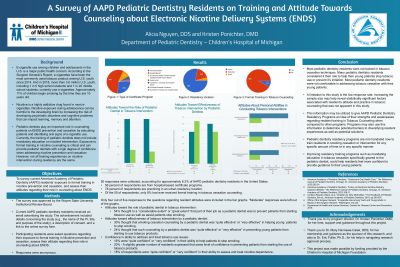Other
473 - A Survey of AAPD Pediatric Dentistry Residents on Training and Attitude Towards Counseling about Electronic Nicotine Delivery Systems (ENDS)


Alicia Nguyen, DDS (she/her/hers)
Pediatric Dentistry Resident
Children’s Hospital of Michigan -— Detroit Medical Center
Children’s Hospital of Michigan -- Detroit Medical Center, Detroit, MI
Royal Oak, Michigan, United States- JS
James P. Stenger, DDS
Pediatric Dentistry Residency Program Director
Childrens Hospital of Michigan
Hazel Park, Michigan, United States - KP
Kristen Ponichter, DDS
Childrens Hospital of Michigan
Hazel Park, Michigan, United States
Presenting Author(s)
Research Mentor(s)
Program Director(s)
Purpose: This research project aims to gain a better understanding of AAPD pediatric dentistry residents’ exposure to formal training in nicotine prevention and cessation, and assess their attitudes regarding their role in counseling about ENDS.
Methods: A Google form survey will be sent to current pediatric dental residents among AAPD Listserv. The anonymous survey consists of eleven questions regarding exposure to formal training in nicotine prevention and cessation, and the participating resident’s attitude regarding their role in counseling patients about ENDS.
Results: 50 responses were collected, accounting for approximately 6.2% of AAPD pediatric dentistry residents in the United States. Of the 50 of respondents, only 8% had ever received formal training in tobacco cessation counseling. 54% thought to a “considerable extent” or “great extent” that part of their role as a pediatric dentist was to prevent patients from starting tobacco use as well as assist patients stop smoking. 30% thought that smoking cessation counseling by a pediatric dentist was “quite effective” or “very effective” in helping young patients to stop smoking. 24% thought that such counseling by a pediatric dentist was “quite effective” or ”very effective” in preventing young patients from starting to use tobacco products. Only 16% were “quite confident” or “very confident” in their ability to help patients to stop smoking. 20% - A slightly greater number of residents expressed that same level of confidence in preventing patients from starting the use of tobacco products. 18% of respondents were “quite confident” or “very confident” in their ability to assess and treat nicotine dependence. .
Conclusion: Most pediatric dentistry residents were not trained in tobacco cessation techniques. Many pediatric dentistry residents considered it their role to help their young patients stop tobacco use or prevent it’s initiation. Most pediatric dentistry residents were not comfortable in addressing tobacco cessation with their young patients. Pediatric dentistry residency programs are not mandated now to train residents in smoking cessation or intervention for any specific amount of time or in any specific manner. Improving residency training programs such as mandating education in tobacco cessation specifically geared to the pediatric dentist, could help residents feel more confident to provide guidance to their young patients.

.jpg)